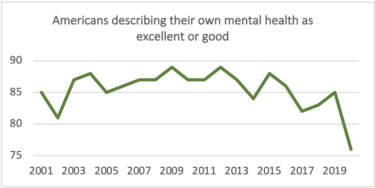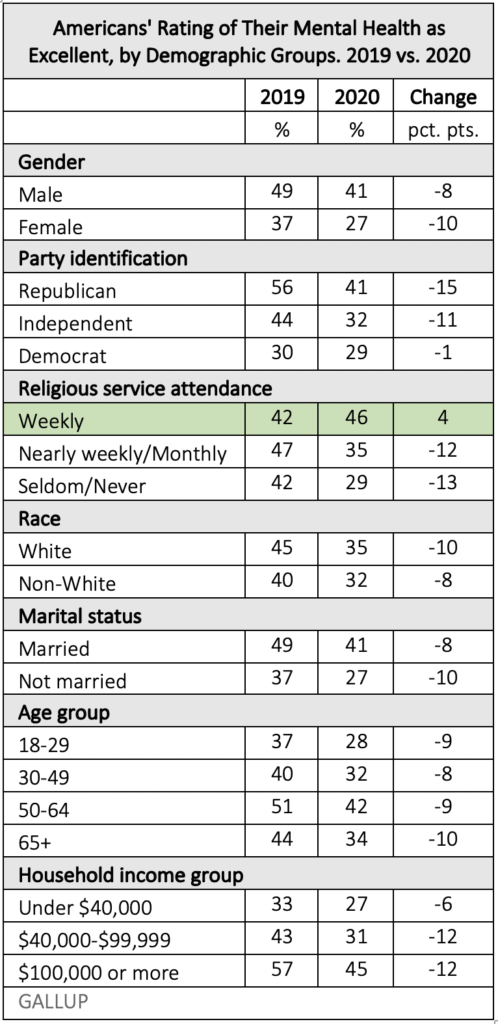
We’ve all heard the stories over the past nine months about how terribly mental health has been affected by COVID. It’s not surprising. People are scared about getting sick, worried about their jobs or businesses that they own, concerned about family members who are vulnerable or far away, and isolated from friends and community. We’ve all experienced it to some degree, and you don’t need a degree in psychology to recognize these as less than optimal conditions for mental health.
I was not at all surprised then to see this week that a Gallop survey reported a rather dramatic drop in Americans’ mental health this year relative to last. Indeed, the number of Americans reporting their mental health as “excellent” or “good” was at the lowest level since Gallop started this survey 20 years ago, at 76%. From 2001-2019, it always ranged between 81% and 89%.
What was surprising, and interesting, were the differences between categories of people. The most dramatic of these was the one group of people that actually reported higher levels of mental health than last year: weekly churchgoers. Among those who attend religious services weekly, 46% reported that their mental health was “excellent,” up from 42% last year. That 46% figure was also the highest of any demographic group surveyed.
I started thinking about why that might be, and the more I thought about it, the more I thought that maybe it made sense. I checked out the Mayo Clinic’s advice about how to manage mental health during a pandemic, and it included:
All of these are things that religious communities help to provide. Many churches have continued to offer various worship services and Bible studies, both online and in person. Those services provide some of the busyness and routine that’s been so difficult to find during this pandemic. They’ve also provided a way for regular attenders to maintain connections with close friends who are almost like family. Isolation has still been hard, but churches have helped to mitigate some of that for people who are actively involved. Many churches have stepped up to support their own members and the wider community during this year of crisis, providing financial support, practical care, and an opportunity for people to do something for others. Perhaps most importantly, religious faith offers hope in something bigger than the pandemic.
That’s not to say that the pandemic hasn’t been hard on faithful churchgoers. It has. Still only 46% of those folks describe their mental health as “excellent.” Attending church isn’t a panacea, and it certainly doesn’t make anyone immune to depression, isolation, anxiety, or worry. But many churches do a pretty good job of creating community, caring for one another, and offering hope. Everyone seems to agree that those are the best defenses against the adverse mental health affects of a pandemic. Maybe what this survey shows is that in practice, as well as in theory, the sort of community created by churches really is exactly what we need in the midst of unprecedented circumstances like those of 2020. But I don’t think this is surprising if we think about it, because Jesus has told us that a love relationship with Him and with each other is what life is all about.
POVs are point of view articles from NC Family staff and contributors